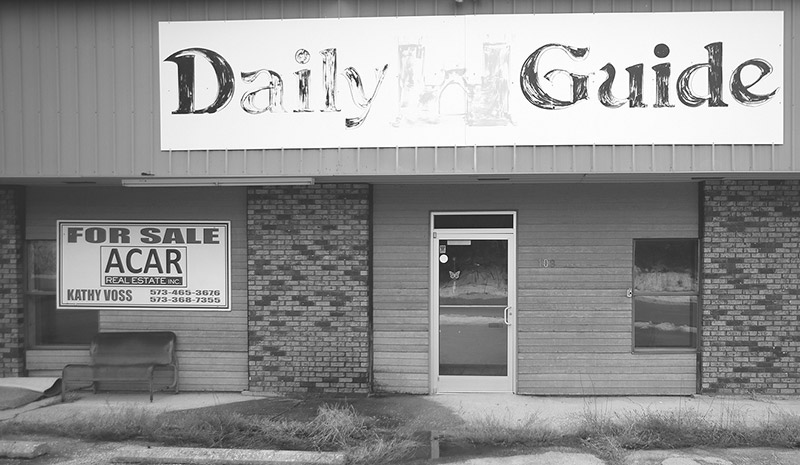Fading Light
Sunshine Week: Final of three part series

Daily Guide office in St. Robert, Mo.
Dotted across the country are exceptions to the brutal new rule, newspapers that are surviving with creative business plans. In North Carolina’s Moore County, owners support the 100-year-old Pilot with revenue raised by side businesses — lifestyle magazines, electronic newsletters, telephone directories, a video production company and a bookstore.
Philanthropy is supporting other efforts to fill gaps created by journalism’s business struggles.
Report for America, which sees itself as a Peace Corps for journalists, has sent young reporters into communities in Mississippi, Texas and elsewhere.
It has relationships with newsrooms across the country, including The Associated Press. The American Journalism Project is raising money to fund local news, and recently announced $42 million in pledges.
What this effort means for Waynesville, and many small towns like it, remains to be seen.
It briefly had an alternative after the Daily Guide folded. A local businessman, Louie Keen, bankrolled a newspaper, the Uranus Examiner, that was delivered for free.
The paper had some journalistic spunk, revealing that the Waynesville mayor had blocked some residents from seeing her postings on the city’s Facebook site. Mayor Hardman said it was inadvertent and quickly corrected.
The paper lasted five issues.
Named for the tourist complex Keen owns, he said the Uranus Examiner was shunned by local advertisers because he used to own a strip club and uses sophomoric jokes to promote his businesses.
So Waynesville and St. Robert are left with Darrell Todd Maurina’s Facebook site, which he calls the Pulaski County Daily News.
A former Army civilian public affairs officer who worked at the Daily Guide in the 2000s, Maurina posts live from community meetings, reports on accidents on the nearby interstate and publishes obituaries. It’s meat-and-potatoes local news.
When he’s not at meetings, he works from a windowless office in the basement of his home. Court documents and papers are piled on the floor and coffee table near a police radio scanner, fax machine and television. On his desk are a well-worn Bible, small American flag and a signed photograph of President Gerald Ford thanking Maurina’s father for his support.
Maurina typically is awake before 5 a.m. to check the local radio station, if the scanner hasn’t roused him earlier.
“I really believe that as large newspaper chains cut staff of small newspapers, and small newspapers wither and die, that’s going to cause major problems in communities,” he said. “Somebody needs to pick up the slack and, at least in this community, I’m able to do that.”
Maurina’s efforts have some support, even from the city councilman who said he once threatened to throw Maurina out a window over a disagreement about a story.
“He’s an equal opportunity agitator,” said Ed Conley, another council member. “He tries to be fair, and to be honest about it, he does a good job, but he’s just one person and he’s limited by social media.”
Maurina declines to share many details about the finances for his online site. He also acknowledges some holes in his coverage, especially of sports.
For local athletics, some people turn instead to a Facebook site run by Allen Hilliard, a former Daily Guide stringer and school bus driver who has been posting photos, videos and newsletters about local youth and high school teams. Hilliard isn’t making much money from his time-consuming hobby, but like Maurina, he takes pride in providing a community service.
“If I quit doing it, then essentially there would be no (sports) coverage of anyone,” he said.
Maurina says he knows journalists need to go back to the basics to survive —or revive — in small-town America.
“We need to go back to what was done in the late 1800s — being everywhere at every event, telling everyone what the sirens were about last night,” he said.
Good idea. Who’s going to pay for it?
Adam Yeomans of AP is sharing this Sunshine Week report about the decrease in local newspapers across the U.S. and the impact on local communities.
Associated Press Business writer Alexandra Olson in New York and video journalist Peter Banda, from Waynesville, contributed to this report.
Follow Dave Bauder at https://twitter.com/dbauder and David A. Lieb at https://twitter.com/DavidALieb

